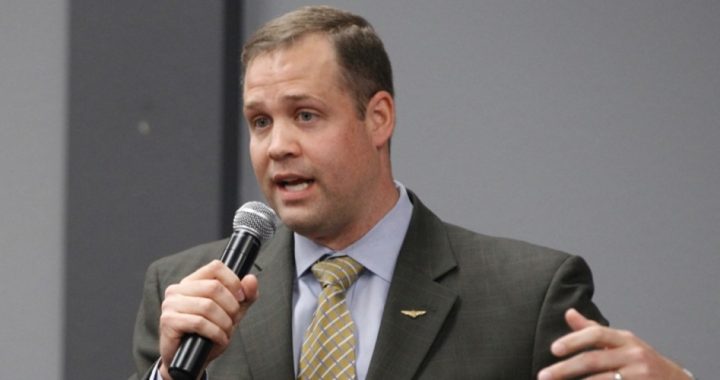
In the politically-charged atmosphere in Washington, even the nomination by President Donald Trump of Representative Jim Bridenstine (R- OKla.) to head up the National Aeronautics and Space Administration (NASA) is now used by Democrats as a political football. The 14-13 vote in the Senate Commerce Committee on Thursday was strictly along party lines.
Bridenstine sports an 80 percent rating in the Freedom Index of The New American magazine, which rates all members of Congress on their fidelity to the U.S. Constitution.
Some Democrats have argued that Bridenstine is too much of a partisan political figure, but Bridenstine has noted that James Webb, the administrator of NASA during the Apollo era (when the first moon landings occurred), was a well-established figure in Democratic Party politics. He was named to the post by President John F. Kennedy (who pledged to put a man on the moon and bring him back safely by the end of the 1960s). Of course, in today’s “politically correct” environment, Kennedy’s pledge to put “a man” on the moon would probably get him branded as a sexist.
Why are Democrats dragging their feet in voting for Bridenstine? Their delaying tactics kept the Oklahoman from receiving a floor vote last year, and they now seem determined to scuttle the nomination permanently. Because the full Senate did not have a scheduled vote on his nomination last year, this forced a return of the nomination to President Trump. Trump immediately sent his nomination back to the Hill.
Senator Bill Nelson, the ranking Democrat on the committee, is leading the opposition to Bridenstine. He declared, “It’s my hope that, sooner or later, we can move on to a qualified candidate, who would quickly be confirmed by broad bipartisan support, as has always been the case with the NASA administrator.”
Opposition to Bridenstine appears centered on his past remarks, questioning man-caused global warming. Other opponents have expressed displeasure that, as an evangelical Christian, he has stated that he regards homosexual relationships as immoral.
Senator Ted Cruz (R-Texas), one of Bridenstine’s strongest champions, declared, “We have been seeing a party-line Democratic wall of opposition to a well-qualified veteran and indeed, a war hero…. It is, unfortunately, too many of our Democratic friends putting partisan politics over the interest of America leading the world in space, over the interest of strong leadership at NASA.”
Cruz added, “We’re now entering the second year without a Senate-confirmed administrator of NASA. That is bad for the United States of America. That is bad for space, it is bad for NASA and, I will note, it is bad in particular for a number of states.” Cruz was referencing not only his own state of Texas, with its Houston Space Center, but also Nelson’s Florida, which has its own NASA facilities.
The support of Cruz for Bridenstine is also understandable from a personal, as well as a political perspective. Bridenstine strongly supported Cruz in the Texan’s bid for the Republican nomination for president in 2016. While President Trump has not allowed Bridenstine’s support for Cruz to keep him from selecting the Oklahoman, it apparently has caused some opposition from another Republican presidential candidate: Senator Marco Rubio of Florida.
Apparently no other Republican has any problem with Bridenstine, but Rubio is reportedly still upset that Bridenstine strongly backed Cruz instead of himself. Bridenstine’s strong support was a factor in Cruz’s winning the Oklahoma presidential primary, a state where Rubio had won the support of most of the state’s Republican establishment.
If all the Republicans in the Senate support Bridenstine, and all the Democrats oppose him, Rubio’s no vote would create a 50-50 tie, requiring a tie-breaking vote by Vice President Mike Pence.
Such unified Democrat opposition to a post nomination usually considered mostly noncontroversial means that the next Supreme Court nominee can also expect unanimous opposition from the Democrats.
Should constitutionalists have any of their own concerns about Bridenstine? Granted that Bridenstine has a strong rating on the Freedom Index, but does he want to pursue policies with NASA that are in accordance with the Constitution? In the past congressional session, Bridenstine introduced the American Space Renaissance Act, and argued that the constitutional support for the space program in general, and his legislation in particular (H.R. 4945) is:
Congress has the power to enact this legislation pursuant to Article I, Section 8 of the Constitution: “The Congress shall have power to … provide for the common Defence.”
Certainly, even during the moon missions and other manned flights, it was widely understood that the space program had a very important national security component, considered especially important during the Cold War. “Success on today’s battlefield depends on space-based capabilities from GPS, to weather, to imagery, to missile warning and communications,” Bridenstine argued. Specifically, his Space Renaissance Act, “Requires [the] military to use ‘hosted payloads’ more frequently. Hosted payloads are ‘ride sharing’ arrangements whereby military systems are integrated into commercial satellites.”
But the Act ventures into areas that have a much more tenuous connection to national defense. For example, it “deems Mars as NASA’s main human spaceflight priority, and requires plans and budgets consistent with that priority.” It is difficult to imagine exactly what military advantage the United States could possibly obtain from sending human beings to Mars.
Furthermore, Bridenstine admits, “The role of government in space has been to pioneer developments where cost and risks are too uncertain or too high for private industry to tackle. As technologies mature and industry steps in with private capital formation, the government role should shift to facilitating private solutions and ensuring a transparent and light-touch regulatory environment.”
While it can be admitted that government has been involved in space when its costs and risks were too high for private industry, that is not an argument for the federal government to use taxpayers’ money to unconstitutionally tackle risky commercial endeavors in space, anymore than it would be an argument for the government to bankroll risky commercial endeavors here on Earth. Whenever such ventures become worth the risk, the private sector jumps in, assuming of course it is not held back by government.
Perhaps Bridenstine and other supporters of NASA should be questioned on such substantive constitutional issues, instead of what he thinks of global warming theories or the morality of homosexuality.
Photo of Rep. Jim Bridenstine: AP Images



